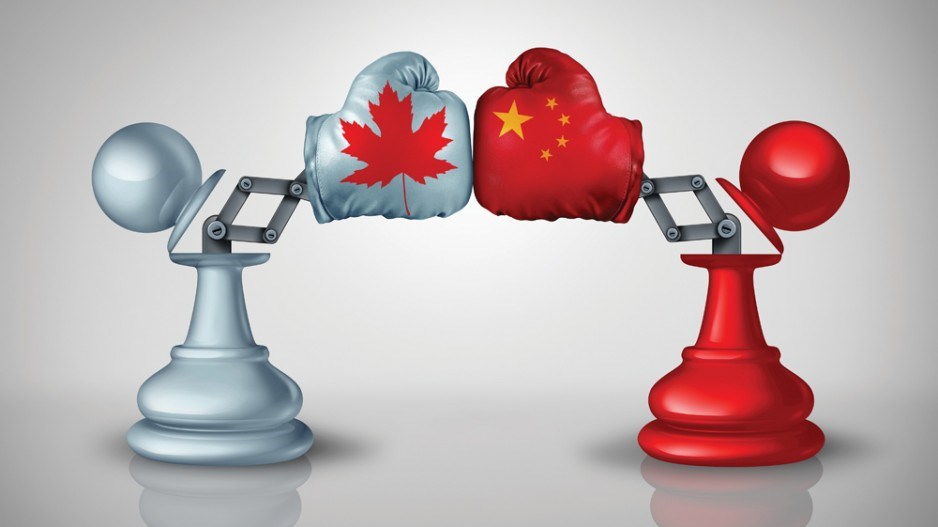Despite a healthy resurgence in trade with China in the pandemic years, Canada should expect an increasingly difficult balance between its economic and geopolitical interests in the coming years with its second-largest trade partner.
That is the assessment of one expert who spoke in Canada recently on the global impact of the Russian invasion of Ukraine. Former Australian prime minister Kevin Rudd also noted that Beijing’s implicit support for Moscow is unlikely to change and could approach points where the West would have to institute economic sanctions if China moves closer to Vladimir Putin’s Russian administration.
Speaking last month at a web event hosted by University of Toronto’s Munk School of Global Affairs and Public Policy, Rudd was asked if the world is seeing a return of the Iron Curtain world of 1949, with China/Russia on one side and western liberal democracies on the other.
“We’re not there yet, but here’s the tripwire in my judgment,” said Rudd, one of the leading experts in the West’s geopolitical tangles with China in the last few decades. “If the Chinese formed a view that it was necessary from their national interest point of view to militarily supply Putin in the field ... I think that becomes a tripwire into a whole new world of global economic and geopolitical chains.
“The world is fragile today. But we would enter into a whole new binary global structure of authoritarian states in one direction and the liberal democratic world in the other direction. And, frankly, a massive contest of influence would result in the rest of the world. ... The question of military supplies is the ultimate determining factor.”
Beijing and Moscow have been close allies for more than a decade, and Putin reached an unprecedented “no limits” friendship agreement with Chinese leader Xi Jinping just weeks prior to Russia’s invasion of Ukraine.
Chinese state media has overwhelmingly taken Russia’s side in the debate, with many reports amplifying Moscow’s point of view on the soundness of Putin’s decision to attack Ukraine. Beijing has also opposed western calls for heavier sanctions and bids to oust Russia from United Nations institutions and has agreed to double its imports of steel-making coal from Russia, while much of the world has shunned Russian exports.
However, China has also danced along a fine line of openly supporting Putin, often abstaining in key UN votes rather than opposing western measures outright.
Gordon Houlden, director emeritus of the China Institute at the University of Alberta, said that while Beijing is being careful with its wording around the Russian issue, that does not mean its core position is unclear.
“I wouldn’t use the word balance, because balance to me implies equality or trying to be equal in treating each side,” Houlden said. “And I would argue that ... even with this language, China is more closely aligned with Russia, and there’s several reasons for that. They have ready access to Russian oil and gas ... and some of the language that Russia uses about Ukraine has some resonance to Chinese ears about Taiwan.”
Despite tensions between the United States and China, recent data shows that American exports to China set a new record in 2021 – but Washington still incurred a goods trade deficit of US$355 billion. Similarly, the European Union exported a record ¤223 billion worth of goods to China in 2021 (while importing another record high of ¤472 billion in Chinese goods).
The picture is the same in Canada, where 2021 exports grew 14 per cent to $29 billion – again, a record high.
The data, Rudd said, highlights how lucrative maintaining the global economic links is to China – and the reasons for its position on not getting too closely behind Russia, whose economy is now in dire straits due to being largely cut off from the global system.
“The Chinese do not want to unnecessarily incur the wrath of the U.S. and its allies in shutting China off from the U.S. dollar-denominate international transaction system,” Rudd said.
But he added that, for anyone who studies China closely, Beijing’s top priority will always be political and physical security. Economic factors are “not insignificant,” but cannot be expected to be viewed by the leadership in Beijing as more than a tool, Rudd noted.
He added that China has been working for decades on creating its own global economic system based on the renminbi as currency and Chinese-led institutions as foundations. As soon as Beijing achieves that, Rudd said, it may feel less hindered by western-led economic sanctions should China choose to impose its geopolitical will through military means.
“Where does that land? In my mind, that lands in the late 2020s, early 2030s,” Rudd said. “I think this is the decade of living dangerously. ... That is really the danger zone when it comes to issues like Taiwan.”




